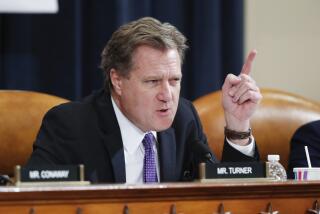Senate panel issues harsh report on Benghazi attack
WASHINGTON — The deadly 2012 assault on the U.S. diplomatic compound in Benghazi, Libya, was caused by the failure of the State Department to adequately protect the facility and poor intelligence-gathering by the CIA and other agencies, according to a harsh assessment by the Senate Intelligence Committee.
The panel’s findings, contained in a declassified 78-page report released Wednesday, criticize the State Department for failing to increase security at the isolated, undermanned compound. That failure came despite “hundreds” of intelligence reports in the months before the Sept. 11, 2012, attack warning that militias and terrorist groups were seeking to strike U.S. facilities and personnel.
Intelligence agencies, meanwhile, failed to provide specific warnings that might have enabled the U.S. to head off the assault despite ample knowledge about the growing dangers, including alerts that had led the CIA to beef up security at its Benghazi base near the diplomatic compound, the report concludes.
“It is imperative that the intelligence community position itself to anticipate, rather than just react to, potential terrorism hot spots ... and that U.S. personnel and facilities overseas are equipped to immediately defend against and withstand any potential attack,” the report says.
Four Americans, including U.S. Ambassador J. Christopher Stevens, were killed that night when more than 60 attackers overwhelmed unarmed Libyan guards and stormed the compound, setting fire to the buildings and engaging in running gun battles with a few CIA and diplomatic security agents.
The report debunks several often-repeated assertions about the attack, including that it erupted spontaneously after protests outside the gates and that the U.S. military could have scrambled personnel and aircraft in the region quickly enough to come to Stevens’ aid.
Sen. Dianne Feinstein (D-Calif.), chairwoman of the Intelligence Committee, said in a statement that she hoped the “report will put to rest many of the conspiracy theories and political accusations.”
But political accusations followed quickly after the report’s release.
Some Republicans on the committee continue to charge that the Obama administration played down the involvement of Al Qaeda-linked militants in the attack.
Democrats contend that the GOP has sought to keep alive the controversy to damage the White House and the potential presidential campaign of Hillary Rodham Clinton, who was secretary of State at the time of the attack.
Feinstein and six other Democrats on the panel, joined by Sen. Angus King, an independent from Maine, issued a conclusion to the report that asserted the attack was “likely preventable” but which spared the White House from criticism, especially over the accuracy of talking points prepared by officials from the CIA, FBI, White House and other agencies in the days immediately after the attack.
There were “no efforts by the White House or any other executive branch entities to ‘cover-up’ facts or make alterations for political purposes,” Feinstein and the others said.
In a scathing separate conclusion, six Republicans on the panel said the report showed that “Americans serving in Libya were vulnerable; the State Department knew they were vulnerable; and no one in the administration really did anything about it.”
Since the attack, no senior officials at the State Department have been fired or disciplined and none of the attackers in Libya have been taken into custody, even though one of them, Ahmed abu Khattala “continued to live freely in Libya while giving taunting interviews to major media outlets,” the lawmakers said.
The Justice Department has issued a sealed indictment of Khattala, officials have said, but the FBI investigation of the incident has been stalled for months by instability in Libya. The country’s weak government has ruled out extraditing its citizens to the U.S.
White House Press Secretary Jay Carney dismissed the Republican criticism. “The administration is focused on … bringing to justice those responsible for the deaths of four Americans, and making sure that we take the steps necessary to improve the security at vulnerable facilities,” he told reporters.
The report provides considerable detail about the often-conflicting security moves made by the embassy in Tripoli, Libya’s capital, and by State Department officials in Washington.
A month before the attack, the department decided against extending the mission of a Pentagon “site security team” made up of 16 special operations personnel who had been sent to Tripoli to aid the embassy, the report said. Army Gen. Carter Ham, then chief of the U.S. military’s Africa Command, twice asked Stevens to keep the team, and twice Stevens declined, the report said.
Yet during the same period, Stevens and other embassy officials also sent several messages to Washington warning that conditions in Benghazi were worsening and asking for additional security, the committee found.
No “significant actions were taken,” the report says. It does not provide any new insight on whether those requests reached Clinton’s desk, which she has denied.
Within hours of the initial attack, then-Defense Secretary Leon Panetta ordered special operations teams and Marine security to respond, but the only military asset that arrived while the assault was still underway was an unarmed Predator drone, a failure the report criticizes.
The report makes 18 recommendations to improve security at diplomatic and intelligence posts overseas, including a call for the State Department to react more quickly to security threats and only in rare instances to use facilities that are inadequately protected. It also says the intelligence community should expand its mining of social media to watch for unrest and draw more heavily on eyewitness reporting, “especially from U.S. government personnel in the aftermath of a crisis.”
Twitter: @davidcloudLAT
More to Read
Start your day right
Sign up for Essential California for news, features and recommendations from the L.A. Times and beyond in your inbox six days a week.
You may occasionally receive promotional content from the Los Angeles Times.






